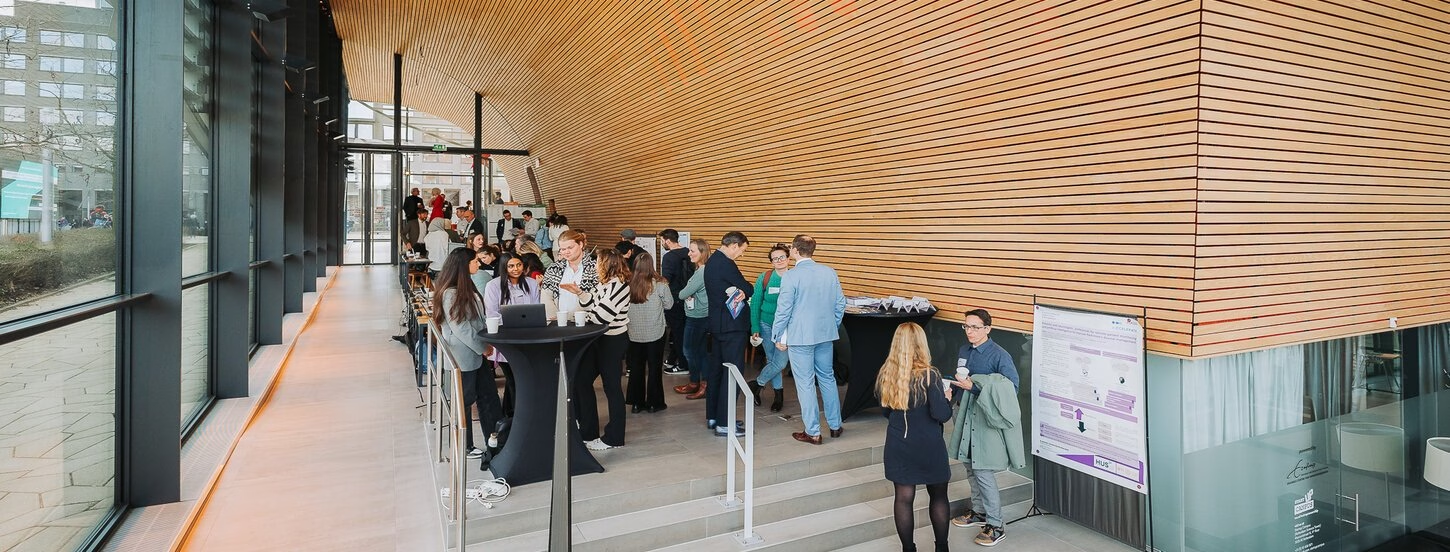Health inequalities are increasing, the number of chronically ill people is rising and health issues are becoming more complex. All the more reason to integrate insights from different scientific disciplines into social policy, so that future interventions become more accessible and better connected to people's daily lives. This message was the focus of the event "Towards Healthy Societies - From resilient governance to digital health solutions," which took place Thursday, 19 January, on campus Woudestein at Erasmus School of Health Policy & Management (ESHPM).
Prevention during the first 1.000 days of life
After a healthy lunch and a welcome speech by Dean Prof. Dr. Maarten IJzerman (ESHPM), Medical Delta Professor Prof. Dr. Andrea Evers (Leiden University, TU Delft, Erasmus University Rotterdam) and Prof. Dr. Anna Nieboer (Erasmus University Rotterdam), the first keynote presentation by Prof. Dr. Jessica Kiefte-de Jong, Professor of Population Health (LUMC) followed. In her keynote, she made it clear how much impact unhealthy conditions have on a child's development and health. Children exposed to risk factors such as neglect and obesity are more likely to adopt an unhealthy lifestyle, develop psychological problems more often and have a shorter life expectancy. Despite this being known, there is still much to be gained when it comes to preventing health problems. Although many good interventions already exist, they are not always sufficiently accessible to those who would benefit most from them. To change this, Kiefte-de Jong says it is necessary to focus on connecting existing initiatives and primary care, and for different organizations to formulate common goals.
Place of residence matters
'Your place of residence matters,' was the central message of the second keynote speaker Prof. Dr. Roland Bal, professor of 'Health Care Policy and Governance' at Erasmus University. For example, life expectancy varies significantly between different neighborhoods in large cities such as Rotterdam. To design healthy cities, it is important to learn from what works well. As an example, Bal mentioned the Cerda grid in Barcelona, which is designed to encourage social connection and outdoor activities. When developing new designs, it is important not to lapse into a top-down approach, but to use co-creation to meet residents' needs and remove obstacles in Dutch neighborhoods, Bal argued. A good example is the Open CityOpens external concept as described by Richard Sennett.
Interactive marketplace
Between the keynote presentations, there were numerous laptop and poster presentations to visit in the foyer of the Erasmus Pavilion. This interactive market provided an opportunity to discuss the latest insights in the Healthy Society field. For example, Isra-al-Dahir (PhD candidate Leiden University) and Jasper Faber (PhD candidate TU Delft) are investigating within the scientific program Medical Delta eHealth & self-management for a healthy societyOpens external why it is that preventive interventions are often not used by people in unfavorable socioeconomic circumstances. By first accurately identifying needs and thresholds, they and their fellow researchers developed an e-Health intervention that better fits the daily lives of the target group.
During their presentation, Angelique Weel-Koenders (rheumatologist and special professor ESHPM) and Deirisa Lopes Barreto (senior researcher Maasstad Hospital) argued for a shift from volume to value when it comes to determining the quality of treatment outcomes. To this end, they developed an innovative dashboard that can be used to personalize patient treatment, so that treatment quality can then be interpreted from the patient perspective.

